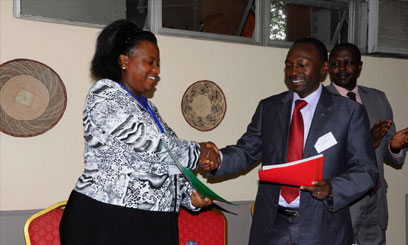Director of Africa Programs for Computer Aid Gladys Muhunyo said that they are part of a network consisting of partners in over 20 African countries, but this is the first centre in Kenya where people can get trained on how to professionally dispose of old electronic gadgets.
“This particular initiative is advocating for people to be aware that when your equipment reaches the end of its shelf life, you should take it somewhere where it can be recycled, reused or refurbished,” she emphasised.
The first training session will have Computer Aid along with the WEEE Centre conducting practical skill training in management of e-waste, while promoting reduce, reuse, refurbish and recycle programs in handling of electronics across the region.
“Let’s get people trained,” she appealed. “Education institutions are increasingly building programs to train people how to handle e-waste, but they haven’t had a practical centre until now,” she added.
To compliment the WEEE Centre, Computer Aid has produced an Advocacy Guide which explains the scope of the WEEE legislation and how people can best comply with it. They have also written numerous special reports related to e-waste and other ICT issues.
Founder of Computers for Schools Kenya Tom Musili said the hardest electronic materials to dispose of are hard plastics, cables, CRT monitors and the mother boards, but he revealed that they have solutions on how to dispose them in an environmentally friendly manner.
“With hard plastics we are able to crush it into powder that can be mixed to make fencing poles. With cables we separate and reuse the copper inside them so that we don’t have to burn the cables. With the CRT monitors we use a cutter to remove and separate the toxins, and with the motherboard we ship it out to our partner in Belgium where they dispose of it responsibly,” he said.
Musili confirmed that the initiative will run on a self-sustaining model and discussions are underway to ensure that both government and e-waste handlers will responsibly adopt these policies.
Environment and Mineral Resources Deputy Secretary Dan Mesis agreed that this initiative will be highly beneficial to the government.
“My ministry is aware of various governmental organisations holding vast amounts of unusable electronic equipment and will endeavour to champion an initiative to have these disposed of in an environmentally friendly way through the WEEE Centre,” he said.
He assured Computer Aid and the WEEE centre that the Government of Kenya, through the Ministry of Environment and Mineral Resources will support their initiatives so that Kenya leads other countries in the vision to contain e-waste in Africa.
The first of three weeklong training sessions to be held this year will be on March 26 at the WEEE Centre and at a local university in Nairobi, and will cost $500 (Sh41,340.73) with accommodations included. Anyone interested can sign up at www.computeraid.org.



































